“山东省泰山学术论坛——农业与环境国际研讨会”通知
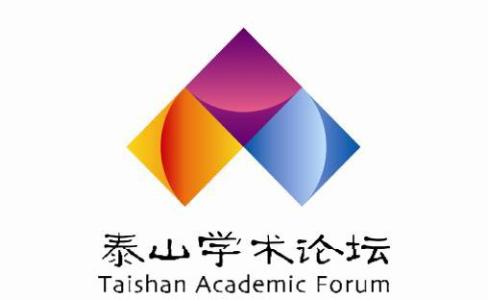
时 间:2012年12月5日
地 点:中国·泰安
主办单位:山东省教育厅
承办单位:山东农业大学
土肥资源高效利用国家工程实验室
国家缓控释肥工程技术研究中心
会议地址:山东农业大学文理大楼会议室
主题内容:探讨新型清洁能源—生物燃料的生产、中国新型作物控释肥研制及产业化
开发应用、全球粮食安全与环境问题、土地利用变化和土地管理对环境的
影响、农药对环境的影响等当前农业环境中的热点、难点问题。
联 系 人:陈向昕 0538-8249858,18853886681;chenxx@sdau.edu.cn
李成亮 0538-8248240,13615489580;chenxx@sdau.edu.cn
“山东省泰山学术论坛——农业与环境国际研讨会”日程表


特 邀 专 家 简 介
Biography of Invited Experts
Dr. Walter T. Bowen
Professor of fertilizer technology and soil fertility,
Director of IFAS International Programs,University of Florida, USA
 Dr. Walter T. Bowen has more than 25 years of international agricultural research and development experience that includes project management; participatory research with smallholder farmers; capacity building for NARS scientists and NGO personnel; and the development, testing, and application of soil and crop growth simulation models. His work has focused on collaborative research, technology dissemination, and process-based model development and application projects in Afghanistan, Albania, Bangladesh, Bolivia, Brazil, Burkina Faso, Cambodia, Colombia, Ecuador, Haiti, Honduras, India, Kenya, Malawi, Malaysia, Mozambique, Nepal, Peru, Romania, Tanzania, Venezuela, and Vietnam. He has held overseas positions with the U.S. Peace Corps, Cornell University, the International Potato Center (CIP), and the International Fertilizer Development Center (IFDC). Dr. Bowen has agricultural research and development experience with cropping systems in Asia, Africa, and Latin America, having lived and worked in agro-environments that stretch from the humid tropics to savannas to high mountains. Dr. Bowen is Director of International Programs, Institute of Food and Agricultural Sciences (IFAS) at the University of Florida. He presently leads several University of Florida programs on international research, education, and development, including trilateral (USA-Brazil-Mozambique; US-Brazil-Honduras) programs focused on food security in Mozambique and Honduras; agricultural capacity-building efforts in Malawi and Tanzania; an agricultural development program in Haiti; agricultural development activities in Iraq; and scientific collaboration on climate change with the International Potato Center in the Andes. Dr. Bowen earned his PhD in Agronomy & Soil Science at Cornell University.
Dr. Walter T. Bowen has more than 25 years of international agricultural research and development experience that includes project management; participatory research with smallholder farmers; capacity building for NARS scientists and NGO personnel; and the development, testing, and application of soil and crop growth simulation models. His work has focused on collaborative research, technology dissemination, and process-based model development and application projects in Afghanistan, Albania, Bangladesh, Bolivia, Brazil, Burkina Faso, Cambodia, Colombia, Ecuador, Haiti, Honduras, India, Kenya, Malawi, Malaysia, Mozambique, Nepal, Peru, Romania, Tanzania, Venezuela, and Vietnam. He has held overseas positions with the U.S. Peace Corps, Cornell University, the International Potato Center (CIP), and the International Fertilizer Development Center (IFDC). Dr. Bowen has agricultural research and development experience with cropping systems in Asia, Africa, and Latin America, having lived and worked in agro-environments that stretch from the humid tropics to savannas to high mountains. Dr. Bowen is Director of International Programs, Institute of Food and Agricultural Sciences (IFAS) at the University of Florida. He presently leads several University of Florida programs on international research, education, and development, including trilateral (USA-Brazil-Mozambique; US-Brazil-Honduras) programs focused on food security in Mozambique and Honduras; agricultural capacity-building efforts in Malawi and Tanzania; an agricultural development program in Haiti; agricultural development activities in Iraq; and scientific collaboration on climate change with the International Potato Center in the Andes. Dr. Bowen earned his PhD in Agronomy & Soil Science at Cornell University.
Dr. John P. Hayes
Professor of wildlife ecology,
Dean for Research & Director of the Florida Agricultural Experiment Station
Director of Ordway-Swisher Biological Station,University of Florida, USA
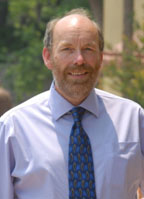 Dr. John P. Hayes is the Dean for Research for the Institute of Food and Agricultural Sciences (IFAS) at the University of Florida, Director of the Florida Agricultural Research Station, and Director of the Ordway-Swisher Biological Station.In his role as IFAS Dean for Research, he oversees research activities of 440 research faculty in 15 academic departments and 12 research and education centers, garnering over $100 million in extramural funding.As Director of the Ordway-Swisher Biological Station he oversees research, education, and conservation activities at the 9,000 acre field station. He has played a leadership role in building a partnership between the Ordway-Swisher and the National Ecological Observatory Network, which selected the Ordway-Swisher as one of 20 sites nationally to serve as a core ecological observatory for North America. Dr. Hayes also currently is President of the National Association of University Fish and Wildlife Programs and serves on the Board of Directors for Bat Conservation International.Prior to his arrival at the University of Florida in 2006, Dr. Hayes spent 14 years at Oregon State University, serving as a professor and Associate Dean for International Programs in the College of Forestry.He received a B.S. in Wildlife Science at Oregon State University, an M.S. in Biology at Southern Oregon University, and a Ph.D. in Ecology and Evolutionary Biology at Cornell University, and was a post-doctoral at the University of Tennessee.His research interests focus on the conservation and ecology of bats, the influences of land management on wildlife, and environmental impacts of wind energy. Dr. Hayes has published roughly 100 publications on a variety of topics, mostly related to wildlife ecology and forest management.
Dr. John P. Hayes is the Dean for Research for the Institute of Food and Agricultural Sciences (IFAS) at the University of Florida, Director of the Florida Agricultural Research Station, and Director of the Ordway-Swisher Biological Station.In his role as IFAS Dean for Research, he oversees research activities of 440 research faculty in 15 academic departments and 12 research and education centers, garnering over $100 million in extramural funding.As Director of the Ordway-Swisher Biological Station he oversees research, education, and conservation activities at the 9,000 acre field station. He has played a leadership role in building a partnership between the Ordway-Swisher and the National Ecological Observatory Network, which selected the Ordway-Swisher as one of 20 sites nationally to serve as a core ecological observatory for North America. Dr. Hayes also currently is President of the National Association of University Fish and Wildlife Programs and serves on the Board of Directors for Bat Conservation International.Prior to his arrival at the University of Florida in 2006, Dr. Hayes spent 14 years at Oregon State University, serving as a professor and Associate Dean for International Programs in the College of Forestry.He received a B.S. in Wildlife Science at Oregon State University, an M.S. in Biology at Southern Oregon University, and a Ph.D. in Ecology and Evolutionary Biology at Cornell University, and was a post-doctoral at the University of Tennessee.His research interests focus on the conservation and ecology of bats, the influences of land management on wildlife, and environmental impacts of wind energy. Dr. Hayes has published roughly 100 publications on a variety of topics, mostly related to wildlife ecology and forest management.
Dr. Christine Waddill
Professor of biofuel technology and plant pathology,
Director of Tropical Research & Education Center, University of Florida, USA
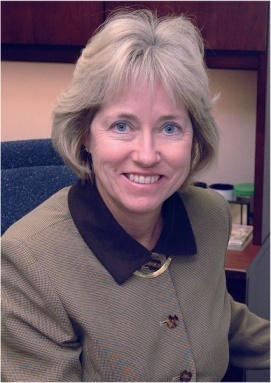 Dr. Christine Waddill currently serves as Center Director for the Tropical Research and Education Center (TREC) as of October 2010.Before coming to TREC she was the Center Director for the Belle Glade Research and Education Center.She joined the faculty at the University of Florida as Dean for Extension and Director of the Florida Cooperative Extension Service on August 23, 1995 and stepped down as Dean on October 3, 2003. Originally from Rochester, New York, Dr. Waddill received her B.A. from Smith College in 1975 and her M.S. and Ph.D., in the field of plant pathology, from the Ohio State University. In October of 1978, she joined the faculty of Michigan State University, in the Department of Botany and Plant Pathology, as an Extension Specialist and Assistant Professor. She assumed administrative responsibilities as project leader of the Extension group and supervisor of the Multi-disciplinary Clinic in 1980. For 10 years she conducted an Extension and Research Program in identification of disease pathogens, disease development and control of vegetable and floriculture disease problems. She became a full professor in that department in 1989.
Dr. Christine Waddill currently serves as Center Director for the Tropical Research and Education Center (TREC) as of October 2010.Before coming to TREC she was the Center Director for the Belle Glade Research and Education Center.She joined the faculty at the University of Florida as Dean for Extension and Director of the Florida Cooperative Extension Service on August 23, 1995 and stepped down as Dean on October 3, 2003. Originally from Rochester, New York, Dr. Waddill received her B.A. from Smith College in 1975 and her M.S. and Ph.D., in the field of plant pathology, from the Ohio State University. In October of 1978, she joined the faculty of Michigan State University, in the Department of Botany and Plant Pathology, as an Extension Specialist and Assistant Professor. She assumed administrative responsibilities as project leader of the Extension group and supervisor of the Multi-disciplinary Clinic in 1980. For 10 years she conducted an Extension and Research Program in identification of disease pathogens, disease development and control of vegetable and floriculture disease problems. She became a full professor in that department in 1989.
She began an Extension Administrative Internship in November of 1988 which ended when she was appointed Assistant to the Director in February of 1989. She continued in this capacity until June 1990 when she was asked to serve as Acting Assistant Director of the Agriculture and Marketing Program in the Cooperative Extension Service with Michigan State University. In May of 1992, she was selected as the Assistant Dean and Program Director for the newly created Agriculture and Natural Resource Director position and served in that position until she accepted the appointment to her current position.
Dr. Nicholas B. Comerford
Professor of Forest Soils,
Director of North Florida Research & Education Center, University of Florida, USA
 Dr. Nicholas B. Comerford is a Professor in the Soil and Water Science Department at the University of Florida and the Director of the North Florida Research and Education Center located in both Quincy and Marianna, Florida. Dr. Comerford is the past president of the Soil Science Society of America, the past Chair of the Board of Directors of the Alliance of Crop, Soil and Environmental Science Societies (ACSESS) Corporation, Senior Fulbright Fellow, Soil Science Society of America Fellow, University of Florida International Fellow, New Zealand National Research Advisory Council Fellow and University of Florida Research Foundation Professor.He received his B.S. in Forestry from the University of Illinois; his M.S. in Forestry from the University of Minnesota; and his PhD from the State University of New York-Syracuse in Silviculture and Forest Influences. He joined the University of Florida in Gainesville in 1980 and moved to Quincy, Florida in 2008 to direct the North Florida Research and Education Center. He has lived and taught in Brazil at Federal and State universities on numerous occasions. His research interests are in soil-tree root interactions, soil nutrient bioavailability, nutrient uptake modeling, tropical forests soils and soil ecosystem services in tropical and temperate environments. He is the author of over 110 refereed publications.
Dr. Nicholas B. Comerford is a Professor in the Soil and Water Science Department at the University of Florida and the Director of the North Florida Research and Education Center located in both Quincy and Marianna, Florida. Dr. Comerford is the past president of the Soil Science Society of America, the past Chair of the Board of Directors of the Alliance of Crop, Soil and Environmental Science Societies (ACSESS) Corporation, Senior Fulbright Fellow, Soil Science Society of America Fellow, University of Florida International Fellow, New Zealand National Research Advisory Council Fellow and University of Florida Research Foundation Professor.He received his B.S. in Forestry from the University of Illinois; his M.S. in Forestry from the University of Minnesota; and his PhD from the State University of New York-Syracuse in Silviculture and Forest Influences. He joined the University of Florida in Gainesville in 1980 and moved to Quincy, Florida in 2008 to direct the North Florida Research and Education Center. He has lived and taught in Brazil at Federal and State universities on numerous occasions. His research interests are in soil-tree root interactions, soil nutrient bioavailability, nutrient uptake modeling, tropical forests soils and soil ecosystem services in tropical and temperate environments. He is the author of over 110 refereed publications.
Dr. Peter J. Stoffella
Professor of Composting and horticulture,
Director of Indian River Research and Education Center Zoe Wilson, University of Florida, USA
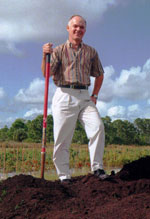 Dr. Peter J. Stoffella is Professor of Horticulture in the Horticultural Sciences Department and serves as Center Director for the Indian River Research and Education Center (IRREC) located in Fort Pierce, Florida. Dr. Stoffella is a Guest Professor at Zhejiang University located in Hangzhou, China. He received a B.S in Horticulture (1976) from Delaware Valley College of Science and Agriculture, M.S. in Horticulture (1977) from Kansas State University, and Ph.D in Vegetable Crops (1980) from Cornell University. He participated in a sabbatical leave at the University of Pisa, Italy. His research interests are focused on the utilization of commercial biodegradable waste by-products in crop management systems. Feedstocks are tested for their chemical, biological, and physical properties. Feedstocks are evaluated as partial substitutes for inorganic nutrients in an effort to minimize nutrient (particularly nitrogen and phosphorus) and heavy metal leaching into ground water and surface water runoff, biological control of weeds, and partial substitute for peat in commercial containerized media. These efforts assist in developing new or modified Best Management Practices (BMPs) for commercial growers. He has edited or co-edited 4 books, and authored or co-authored 8 book chapters and over 170 peer-review journal articles. Dr. Stoffella is a member of the Scientific Advisory Board of Compost Science and Utilization journal. He has served on 13 MS and 11 Ph.D student committees and hosted several international PostDoctorate students and Visiting Scientists. Dr. Stoffella received the Outstanding Researcher award from the American Society for Horticultural Science, Rufus Chancy award for Research Excellence from the US Composting Council, and the Wilson Popenoe award from the InterAmerican Society for Tropical Horticulture.He is a Fellow of the American Society for Horticultural Science.
Dr. Peter J. Stoffella is Professor of Horticulture in the Horticultural Sciences Department and serves as Center Director for the Indian River Research and Education Center (IRREC) located in Fort Pierce, Florida. Dr. Stoffella is a Guest Professor at Zhejiang University located in Hangzhou, China. He received a B.S in Horticulture (1976) from Delaware Valley College of Science and Agriculture, M.S. in Horticulture (1977) from Kansas State University, and Ph.D in Vegetable Crops (1980) from Cornell University. He participated in a sabbatical leave at the University of Pisa, Italy. His research interests are focused on the utilization of commercial biodegradable waste by-products in crop management systems. Feedstocks are tested for their chemical, biological, and physical properties. Feedstocks are evaluated as partial substitutes for inorganic nutrients in an effort to minimize nutrient (particularly nitrogen and phosphorus) and heavy metal leaching into ground water and surface water runoff, biological control of weeds, and partial substitute for peat in commercial containerized media. These efforts assist in developing new or modified Best Management Practices (BMPs) for commercial growers. He has edited or co-edited 4 books, and authored or co-authored 8 book chapters and over 170 peer-review journal articles. Dr. Stoffella is a member of the Scientific Advisory Board of Compost Science and Utilization journal. He has served on 13 MS and 11 Ph.D student committees and hosted several international PostDoctorate students and Visiting Scientists. Dr. Stoffella received the Outstanding Researcher award from the American Society for Horticultural Science, Rufus Chancy award for Research Excellence from the US Composting Council, and the Wilson Popenoe award from the InterAmerican Society for Tropical Horticulture.He is a Fellow of the American Society for Horticultural Science.
Dr. Ramachandran P. K. Nair
Distinguished Professor of Agroforestry & International Forestry, Director of Center for Subtropical Agroforestry,University of Florida, USA
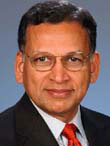 Dr. PK Nair, Distinguished Professor of Agroforestry at the University of Florida, USA, is a pioneering researcher and educator and a world leader in agroforestry. Dr. Nair was educated in India (BSc, MSc, and PhD), England (post-doctoral), and Germany (Dr. sc. agr. Degree). His path-breaking research on multistrory cropping in his native southern India during the 1970s led to his involvement as one of the founders of ICRAF, in Kenya. As a scientist at ICRAF for nearly 10 years, he played a key role in developing the discipline of agroforestry and building up ICRAF as a CGIAR center. He moved to the University of Florida (UF) as Professor of Agroforestry in 1987, where he established the Interdisciplinary Program and the Center for Subtropical Agroforestry. At UF, he continues to train graduate students (25 PhDs so far) and visiting scientists from around the world, and provide global leadership in agroforestry research and education. As a world leader in the subject, his services are sought the world over. Professor Nair is the author/editor of 14 books, 40 book chapters, and nearly 200 peer-reviewed journal articles, all related to agroforestry. He was the Editor-in-Chief of Agroforestry Systems journal for 11 years until 2005. In 2004, he started the book series “Advances in Agroforestry” (Springer), of which he is the editor; nine books have been published in the series so far. He showed exemplary leadership in organizing the World Congresses in Agroforestry: the first in Orlando, Florida, 2004; and the second in Nairobi, Kenya, 2009. PK Nair has received numerous awards and recognitions.He is a Fellow of the American Association for the Advancement of Science, and the American Societies of Agronomy, Crop Science, and Soil Science; he has received IUFRO (International Forestry Research) Scientific Award; multiple awards from the Society of American Foresters; four honorary Doctor of Science degrees (Kyoto, Japan; Kumasi, Ghana; Guelph, Canada; and Santiago de Compostela, Spain); the Hind Rattan (Jewel of India) Award of India; and the Humboldt Prize of Germany.
Dr. PK Nair, Distinguished Professor of Agroforestry at the University of Florida, USA, is a pioneering researcher and educator and a world leader in agroforestry. Dr. Nair was educated in India (BSc, MSc, and PhD), England (post-doctoral), and Germany (Dr. sc. agr. Degree). His path-breaking research on multistrory cropping in his native southern India during the 1970s led to his involvement as one of the founders of ICRAF, in Kenya. As a scientist at ICRAF for nearly 10 years, he played a key role in developing the discipline of agroforestry and building up ICRAF as a CGIAR center. He moved to the University of Florida (UF) as Professor of Agroforestry in 1987, where he established the Interdisciplinary Program and the Center for Subtropical Agroforestry. At UF, he continues to train graduate students (25 PhDs so far) and visiting scientists from around the world, and provide global leadership in agroforestry research and education. As a world leader in the subject, his services are sought the world over. Professor Nair is the author/editor of 14 books, 40 book chapters, and nearly 200 peer-reviewed journal articles, all related to agroforestry. He was the Editor-in-Chief of Agroforestry Systems journal for 11 years until 2005. In 2004, he started the book series “Advances in Agroforestry” (Springer), of which he is the editor; nine books have been published in the series so far. He showed exemplary leadership in organizing the World Congresses in Agroforestry: the first in Orlando, Florida, 2004; and the second in Nairobi, Kenya, 2009. PK Nair has received numerous awards and recognitions.He is a Fellow of the American Association for the Advancement of Science, and the American Societies of Agronomy, Crop Science, and Soil Science; he has received IUFRO (International Forestry Research) Scientific Award; multiple awards from the Society of American Foresters; four honorary Doctor of Science degrees (Kyoto, Japan; Kumasi, Ghana; Guelph, Canada; and Santiago de Compostela, Spain); the Hind Rattan (Jewel of India) Award of India; and the Humboldt Prize of Germany.
Dr. Rafael Muñoz -Carpena
Professor of Hydrology and Water Quality,
Agricultural and Biological Engineering Department, University of Florida, USA
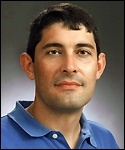 Dr. Rafael Muñoz-Carpena is professor of hydrology and water quality at UF/IFAS Agricultural and Biological Engineering department. He received his BS, MS and PE from Universidad Politécnica de Madrid in 1989 and PhD from North Carolina State University in 1993.He specializes on global sensitivity and uncertainty of environmental models; surface, vadose zone and groundwater hydrology; water quality and hydrological modeling; water conservation, surface contaminant transport through vegetation (vegetative filter strips). He has published 75 refereed papers, 32 extension articles, 10 book chapters, authored 1 book and edited 3 others.He was an associate editor for the Transactions of ASABE, Applied Engineering in Agriculture, and Vadose Zone Journal. He is also one of the most internationally active professors at the college.He has collaborated with scientists in Europe, Latin America, and Africa for many years.He received many awards including University of Florida Research Foundation Professor (UF), Junior Faculty Award of Merit (Gamma Sigma Delta), Special Recognition Award (FL section of the American Society of Agricultural and Biological Engineers), International Achievement Award (UF/IFAS), International Educator Award (UF). He has chaired or co-chaired 15 PhD and 7 MS students, served as a committee member for 15 other graduate students, and supervised 6 postdoctoral fellows and many international visiting scientists.
Dr. Rafael Muñoz-Carpena is professor of hydrology and water quality at UF/IFAS Agricultural and Biological Engineering department. He received his BS, MS and PE from Universidad Politécnica de Madrid in 1989 and PhD from North Carolina State University in 1993.He specializes on global sensitivity and uncertainty of environmental models; surface, vadose zone and groundwater hydrology; water quality and hydrological modeling; water conservation, surface contaminant transport through vegetation (vegetative filter strips). He has published 75 refereed papers, 32 extension articles, 10 book chapters, authored 1 book and edited 3 others.He was an associate editor for the Transactions of ASABE, Applied Engineering in Agriculture, and Vadose Zone Journal. He is also one of the most internationally active professors at the college.He has collaborated with scientists in Europe, Latin America, and Africa for many years.He received many awards including University of Florida Research Foundation Professor (UF), Junior Faculty Award of Merit (Gamma Sigma Delta), Special Recognition Award (FL section of the American Society of Agricultural and Biological Engineers), International Achievement Award (UF/IFAS), International Educator Award (UF). He has chaired or co-chaired 15 PhD and 7 MS students, served as a committee member for 15 other graduate students, and supervised 6 postdoctoral fellows and many international visiting scientists.
Dr. Yuncong Li
Professor of Soil and Water Science,University of Florida, USA
 Dr. Yuncong Li is the Professor of Soil Science in the Department of Soil and Water Science at the Tropical Research and Education Center, IFAS, University of Florida in Homestead, FL. He was born and grew up in Shandong, China, and Came to America in 1987. He received his B.S. (1982) in Soil Science and Agricultural Chemistry from the Shandong Agricultural University, China, his M.S. (1990) in Agronomy from the University of Georgia, and his Ph.D. (1993) in Environmental Science from the University of Maryland. He is also an Affiliated Professor at the University of Florida’s Center for Tropical Agriculture, Hydrologic Sciences Academic Cluster, School of Natural Resources & Environment, and Water Institute, and Courtesy Professor at the Shandong Agricultural University and Chinese Academy of Tropical Agricultural Sciences. He has received many awards and distinctions including Fellow of both the American Society of Agronomy and the Soil Science Society of America; Foodand Agriculture Organization (FAO) Fellow; Wilson Popenoe Award (InterAmerican Society for Tropical Horticulture); Outstanding Paper Award (Florida State Horticultural Society); Jim App Award (University of Florida); Junior Faculty Research Award (Sigma Xi, the international honor society of science and engineering); Senior Faculty Award (Gamma Sigma Delta, the honor society of agriculture); Research Innovation Award (University of Florida); Wachovia Extension Professional Award and Art Hornsby Distinguished Extension Award (Extension Association of Florida); International Educator of the Year (University of Florida, IFAS) and Research Foundation Professor Award (University of Florida). His research and extension program focuses on water and soil quality monitoring, assessment and remediation, management practices to improve nutrient use efficiency, and nutrient cycling in soils/sediments. He has authored or co-authored over 150 research papers, 70 extension articles and 14 book chapters. He recently edited two books, Water Quality Concepts, Sampling, and Analyses and Handbook of Soil Sciences. He serves as an associate editor for two journals, Critical Reviews in Environmental Science and Technology and Communications in Soil Science and Plant Analysis. Additionally, He has chaired or co-chaired 24 PhD and MS students, served as a committee member for 24 other graduate students, and supervised 15 postdoctoral fellows and many international visiting scientists.
Dr. Yuncong Li is the Professor of Soil Science in the Department of Soil and Water Science at the Tropical Research and Education Center, IFAS, University of Florida in Homestead, FL. He was born and grew up in Shandong, China, and Came to America in 1987. He received his B.S. (1982) in Soil Science and Agricultural Chemistry from the Shandong Agricultural University, China, his M.S. (1990) in Agronomy from the University of Georgia, and his Ph.D. (1993) in Environmental Science from the University of Maryland. He is also an Affiliated Professor at the University of Florida’s Center for Tropical Agriculture, Hydrologic Sciences Academic Cluster, School of Natural Resources & Environment, and Water Institute, and Courtesy Professor at the Shandong Agricultural University and Chinese Academy of Tropical Agricultural Sciences. He has received many awards and distinctions including Fellow of both the American Society of Agronomy and the Soil Science Society of America; Foodand Agriculture Organization (FAO) Fellow; Wilson Popenoe Award (InterAmerican Society for Tropical Horticulture); Outstanding Paper Award (Florida State Horticultural Society); Jim App Award (University of Florida); Junior Faculty Research Award (Sigma Xi, the international honor society of science and engineering); Senior Faculty Award (Gamma Sigma Delta, the honor society of agriculture); Research Innovation Award (University of Florida); Wachovia Extension Professional Award and Art Hornsby Distinguished Extension Award (Extension Association of Florida); International Educator of the Year (University of Florida, IFAS) and Research Foundation Professor Award (University of Florida). His research and extension program focuses on water and soil quality monitoring, assessment and remediation, management practices to improve nutrient use efficiency, and nutrient cycling in soils/sediments. He has authored or co-authored over 150 research papers, 70 extension articles and 14 book chapters. He recently edited two books, Water Quality Concepts, Sampling, and Analyses and Handbook of Soil Sciences. He serves as an associate editor for two journals, Critical Reviews in Environmental Science and Technology and Communications in Soil Science and Plant Analysis. Additionally, He has chaired or co-chaired 24 PhD and MS students, served as a committee member for 24 other graduate students, and supervised 15 postdoctoral fellows and many international visiting scientists.
Dr. Chonghua Zhang
Professor and Director of UF Beijing Center
 Dr. Chonghua Zhang is the Director of University of Florida Beijing Center, with the responsibility of promoting student and academic exchange between Chinese universities and University of Florida. In his current role, Dr. Zhang managedstudy abroad program for Florida students and recruited many Chinese students to study at University of Florida, in particular those outstanding students sponsored by China Scholarship Council. Dr. Zhang also identifies contact at University of Florida for Chinese visiting scholars and vise versa. Dr. Zhang worked for the international program of Purdue University for twelve years. From 1997 to 2002, Dr. Zhang was the representative of Winrock International Institute for Agricultural Development in Beijing. Financed by the World Bank, Asian Development Bank and Ford Foundation, Dr. Zhang implemented projects in the areas of renewable energy, rural women leadership development, rural micro-financing and fostering the first group of western professors educated Chinese agriculture economics Ph.D. students. The graduate of this group of students are holding key positions in agriculture economics in some top Chinese agricultural universities today. Dr. Zhang received his B.S. degree in Chemical Engineering and Ph.D. in Environmental Engineering from University of Wisconsin at Madison. In 1977, Dr. Zhang was one of the few Chinese students in the United States received approval by the Chinese government to come back to work in China. From 1998 to 1980, Dr. Zhang worked for the environmental protection division of Shanghai Petrochemical Plant. From 1980 to 1990, Dr. Zhang was Director of Department of Science and Technology of the National Environmental Protection Bureau. At the same period, Dr. Zhang was adjunct professor teaching at the Environmental Engineering Department of Tsinghua University. At this period Dr. Zhang devoted his time participating in the institutional development of the Chinese environmental protection institution at the national, provincial and municipal levels, including the drafting of environmental regulations and standards. From 1990 to 1996, Dr. Zhang worked at the Asia Environment Division of the World Bank in Washington, D. C. with the responsibility of preparing the environmental investment components of the World Bank’s loan projects, and his focus is in pollution prevention.
Dr. Chonghua Zhang is the Director of University of Florida Beijing Center, with the responsibility of promoting student and academic exchange between Chinese universities and University of Florida. In his current role, Dr. Zhang managedstudy abroad program for Florida students and recruited many Chinese students to study at University of Florida, in particular those outstanding students sponsored by China Scholarship Council. Dr. Zhang also identifies contact at University of Florida for Chinese visiting scholars and vise versa. Dr. Zhang worked for the international program of Purdue University for twelve years. From 1997 to 2002, Dr. Zhang was the representative of Winrock International Institute for Agricultural Development in Beijing. Financed by the World Bank, Asian Development Bank and Ford Foundation, Dr. Zhang implemented projects in the areas of renewable energy, rural women leadership development, rural micro-financing and fostering the first group of western professors educated Chinese agriculture economics Ph.D. students. The graduate of this group of students are holding key positions in agriculture economics in some top Chinese agricultural universities today. Dr. Zhang received his B.S. degree in Chemical Engineering and Ph.D. in Environmental Engineering from University of Wisconsin at Madison. In 1977, Dr. Zhang was one of the few Chinese students in the United States received approval by the Chinese government to come back to work in China. From 1998 to 1980, Dr. Zhang worked for the environmental protection division of Shanghai Petrochemical Plant. From 1980 to 1990, Dr. Zhang was Director of Department of Science and Technology of the National Environmental Protection Bureau. At the same period, Dr. Zhang was adjunct professor teaching at the Environmental Engineering Department of Tsinghua University. At this period Dr. Zhang devoted his time participating in the institutional development of the Chinese environmental protection institution at the national, provincial and municipal levels, including the drafting of environmental regulations and standards. From 1990 to 1996, Dr. Zhang worked at the Asia Environment Division of the World Bank in Washington, D. C. with the responsibility of preparing the environmental investment components of the World Bank’s loan projects, and his focus is in pollution prevention.
Dr. Gengxing Zhao
Professor of soil and land resources and remotesensing application,
Dean of College of Resources and Environment,Shandong Agricultural University, China
 Dr. Zhao is the council member of China Land Resource Society, standing director of Shandong Land Resource Society, Soil Science Society, Remote Sensing Technology Application Society, Agricultural Environment Protection Society, and member of Shandong Agricultural Advisory Group. He is also the member of Agricultural Resource Utilization Committee for Agricultural Extension Professional Degree in China, and column associate editor of Transactions of the Chinese Society of Agricultural Engineering (CSAE).
Dr. Zhao is the council member of China Land Resource Society, standing director of Shandong Land Resource Society, Soil Science Society, Remote Sensing Technology Application Society, Agricultural Environment Protection Society, and member of Shandong Agricultural Advisory Group. He is also the member of Agricultural Resource Utilization Committee for Agricultural Extension Professional Degree in China, and column associate editor of Transactions of the Chinese Society of Agricultural Engineering (CSAE).
Dr. Zhao has worked on SDAU since 1985 and got his Ph.D. in Land Resource and Remote Sensing from Zhejiang University in 1998, M.S. in Land Resource in 1990 and B.S. in Soil & Chemistry in 1985 from SDAU. He has ever conducted cooperative research as visiting professor in the Institute for Geospatial Research and Education, Eastern Michigan University from Feb. to Aug. 2009, and in Dept of Geology and Geography, West Virginia University in the US from Feb. 2001 to Mar. 2002, respectively.
The main courses he taught are Progress in Resource Science, Soil Resources and Information Technology, Resource and Environment Informatics for graduate students, and Remote Sensing Basics, Remote Sensing Image Processing and Application for undergraduate students. Currently, there are 15 doctorial and Master graduate students under his supervision.
Dr. Zhao has been actively involved in research of remote sensing acquisition and monitoring for agricultural resources, ecological effects and RS models of LUCC, GIS supported quantitative and automatic land evaluation, and nutrient and yield estimation for crops and apple tree. He has served as principal investigators in more than 20 projects sponsored by the National High Technology Research and Development Program of China, the National “Spark Plan” of China, the Ministry of Science and Technology of China, the National Science Foundation of China, and Agricultural Department of China etc. He is recipient of over 10 Scientific and Technological Achievement Awards at national and provincial levels. In addition, he has published more than 170 papers on peer-reviewed journals such as International Journal of Remote Sensing, Pedosphere, China Land Science, Transactions of CSAE, Acta Ecologica Sinica, Spectroscopy and Spectral Analysis, and Journal of Natural Resources. As associate editor and editor, he has published 15 monographs.
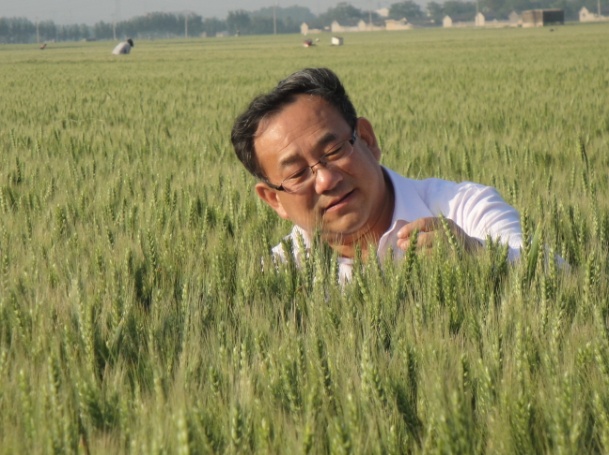 Dr. Zhenlin Wang
Dr. Zhenlin Wang
Professor of Agronomy and Crop Science, Dean of Graduate School
Shandong Agricultural University, China
| EDUCATIONAL EXPERIENCE |
| Sep.1987 – Jul.1990 | Ph. D.Agronomy and Crop Science,Shandong Agricultural University |
| Sep.1982 – Jul.1985 | M. S.Agronomy and Crop Science,Shandong Agricultural University |
| Sep.1978– Jul.1982 | B. S.Agronomy ,Shandong Agricultural College |
| PROFESSIONALEXPERIENCE |
| Oct.1998 – present | Prof. of Agronomy College and Dean of Graduate school in Shandong Agricultural University |
| Nov.1996 – Oct.1998 | Prof. of Agronomy College in Shandong Agricultural University |
| Nov.1993 – Oct.1996 | Associate Prof. of Agronomy College in Shandong Agricultural University |
| Oct.1992 – Nov.1993 | Visiting Scholar in Melitopol Agrimechanization Insitute, Ukrain |
| Jul.1990 – Oct.1992 | Lecturer in Agronomy Department in Shandong Agricultural University |
| Aug.1985 – Sep.1987 | Teaching Assistant in Agronomy Department in Shandong Agricultural University |
DEPARTMENTAL RESEARCH AREAS
Crop Physiology, Crop Production and Management
RESEARCH FOCUS
His researches cover a wide range of issues on food crop production management, including work on crop physiology, water and nutrients use efficiency, soil improving for higher crop yielding, crop rotation, and integrated technology of crop production for higher yielding, higher quality and higher use efficiencies of water and nutrients.
EXTENSION FOCUS
Provides training of crop cultivation technology for higher yielding, higher quality and higher use efficiencies of water and nutrients;Organizes and participates workshops on crop biology and crop cultivation technology; Trains and provides technical assistance to county extension agents.
COURSES CURRENTLY TAUGHT
Crop Cultivation Technology
Crop Physiology and Ecology
RESEARCH GRANTS
He has led more than ten research projects supported by National Natural Science Foundation of China, Ministry of Science and Technology of China, Ministry of Agriculture of China, and other state agencies. The grants from state agencies during last five years were more than RMB 34.6 million.
Dr. Jiwang Zhang
Professor of Agronomy College,Shandong Agricultural University, China
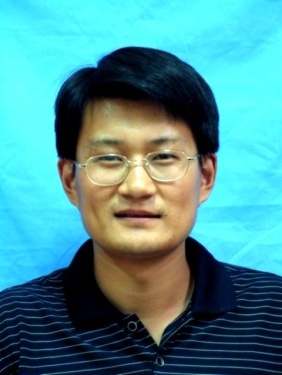
Primary Disciplines
Plant Physiology
Soil Fertility
Grain Crops (Summer maize)
Crop Management and Environmental Systems
Education
Ph.D.: Agronomy, Agronomy college of Shandong Agricultural University,2002-2005
M.S.: Agronomy, Agronomy college of Shandong Agricultural University
B.S.: Agronomy, Agronomy college of Shandong Agricultural University
Working experience
July, 2000-June, 2002, Assistant professor at Agronomy college of SDAU
July, 2002-June, 2006, Lecturer at Agronomy college of SDAU
July, 2006-June, 2010, Associate professor at Agronomy college of SDAU
July, 2010-nowdays, Professor at Agronomy college of SDAU
Teaching Honors
The second prize at the third session of the youth teachers teaching skills competition in Shandong Agricultural University
Mainly scientific research task
2009-2013, State Key Program of Basic Research of China, Project (No. 2009CB118602)
2009-2013, Special Fund for Agro-scientific Research in the Public Interest, Project (No. 200903003)
2011-2014, Shandong Province Maize Industry Technology System
2012-2015, National Natural Science Foundation of China (No. 31271662)
2011-2015, National Science and technology support program (No. 2011BAD21B0601)
Research Honors and Awards
Journal Articles
37 journal articles published as first author and corresponding author.
Dr. Yong Wang
Professor of College of Life Science,Shandong Agricultural University, China
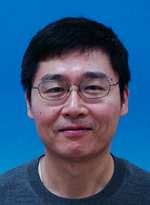 EDUCATION:
EDUCATION:
Nov. 2000-Jan. 2006: Ph.D in Biology
University of Lausanne, Lausanne, Switzerland
Major: Plant Molecular Biology
Teaching assistant in Biology
Sep. 1990-Jul. 1993: Master in Agronomy
Shandong Agricultural University, Taian,China
Major: Genetics and Breeding of Plant
Sep. 1986-Aug. 1990: Bachelor in Agronomy
Shandong Agricultural University, Taian, China
Major: Agronomy
WORK EXPERIENCE:
Nov. 2010-present: Professor
College of Life Sciences,Shandong Agricultural University
Jan. 2006-Nov. 2010:Postdoctoral scientist
Division of Biological Sciences,University of California, San Diego;Lab: Prof. Nigel Crawford
Oct. 1999-Oct. 2000: Visiting scholar
Institute of Plant Molecular Biology,French National Center for Scientific Research (CNRS), Strasbourg, France
Lab: Prof. Francis Durst
Jul. 1999-Sep. 1999:Visiting scholar
Institute of Crop Germplasm Resources,Chinese Academy of Agricultural Science (CAAS), Beijing, China
Lab: Dr. Jizeng Jia
Aug. 1996-Jun. 1999: Lecturer
Department of Agronomy,Shandong Agricultural University, Taian, China
Lab: Prof. Qingqi Li
Aug. 1993-Jul. 1996: Assistant
Department of Agronomy,Shandong Agricultural University, Taian, China
Lab: Prof. Qingqi Li
Research interests
1. Cloning, characterization, and utilization of key genes involved in plant nitrate signaling pathway
Nitrate serves as both a nutrient and a signal molecule. The nitrate signal triggers the primary nitrate signal response, and affects root development and architecture to control nitrogen uptake. To elucidate the genes and mechanisms of nitrate regulation, we have been using forward genetic screen to isolate nitrate regulatory mutants. The corresponding genes will be cloned and characterized to understand their function and regulation mechanism. In the mean time, forward genetics and genomics methods will be used to clone the nitrate regulatory genes in crops such as rice, wheat and maize. The function and molecular mechanism of these genes will be studied to shed lights on breeding new varieties with higher nitrogen use efficiency.
2. Cloning and characterization of phosphate regulatory genes
Phosphate availability in soil is a key factor limiting the development and productivity of crops. Over use of phosphate fertilizer in agriculture and the low phosphate use efficiency has caused serious problems like eutrophication. Breeding new varieties with higher phosphate use efficiency is one of the key solutions to solve the problem. Therefore studying the mechanism of phosphate regulation is of great importance. We are setting up a forward genetic screen system to isolate new phosphate regulatory mutants. The corresponding genes will be cloned and characterized. The elucidation of the phosphate regulatory gene network and mechanisms will definitely benefit the breeding of new varieties with higher phosphate use efficiency.
Dr. Lingrang Kong
Professor of Wheat Breeding and Genetics,
State Key Laboratory of Crop Biology,
Dean of College of International Exchange,Shandong Agricultural University, China
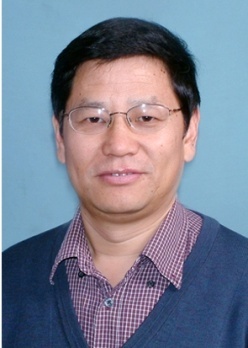 Area of Expertise: Plant Breeding and Genetics
Area of Expertise: Plant Breeding and Genetics
EDUCATION AND APPOINTMENTS:
2008-Present. “Taishan Scholars” Professor of Wheat Molecular Breeding, and Dean of College of International Exchange, Shandong Agricultural Umiversity, Taian, P. R. China
2003-March 2008. Research Geneticist, Department of Agronomy, Purdue University, W. Lafayette, IN, USA
2000-2003: Postdoctoral research associate, Department of Agronomy, Purdue University, W. Lafayette, IN, USA
May 2000-Sept. 2000: Postdoctoral research associate. Institute of Evolution, Haifa University, Haifa, Israel
1999-2000: Professor. Plant Genetics Engineering Laboratory, Department of Agronomy, Shandong Agricultural University, Taian, P. R. China
1998-1999: Associate Professor, Plant Genetics Engineering Laboratory, Department of Agronomy, Shandong Agricultural University, Taian, P. R. China
1997-1998: Postdoctoral research associate, Division of Plant Breeding, Technical University of Munich, Freising-Weihenstephan, Germany
1996-1997: Associate Professor, Plant Genetics Engineering Laboratory, Department of Agronomy, Shandong Agricultural University, Taian, P. R. China
1988-1993: Assistant Professor, Department of Agronomy, Shandong Agricultural University, Taian, P. R. China
1993-1996: Ph.D. in plant breeding and genetics, Chinese Academy of Agricultural Sciences, Beijing, P. R. China
1985-1988: M.S. in plant breeding and genetics, Shandong Agricultural University, Taian, P. R. China
1981-1985: B.S. in agronomy, Shandong Agricultural University, Taian, P. R. China
RESEARCH INTERESTS
Wheat Applied Genomics
Interest Gene (QTLs) Mapping and Cloning
Comparative Genomics of Wheat
Wheat Molecular Breeding
Wheat Molecular Cytogenetics
PUBLICATIONS:
50 refereed journal articles, 1 book, 2 book chapters, and 30 non-refereed publications.
TEACHING
Genetics
Cytogenetics
Counsel undergraduate students
CURRENT PROJECTS:
Fine mapping of FHB resistance gene derived from Lophpyrum ponticum and its transfer to wheat by marker-assisted selection. 2011-1013, National Science Foundation of China.
Fine mapping of NUE gene derived from Aegilops tauschii and its transfer to wheat by marker-assisted selection. 2012-2015, National Science Foundation of China.
Molecular design of resistance traits against diseases and insect pests and germplasm enhancement. 2009-2013, National Basic Research Program of China (973 Program).
Creation of new wheat germplasms with interest traits by chromosome engeering. 2011-2015, National High-Tech Research and Development Program (
863 Program).
Development of transgenic wheat new cultivars with high quality. 2012-2013, China National Special Program for Development of Transgenic Plant & Animal New Cultivars.
Construction of national Huang-Huai-Hai industrialization base of transgenic wheat cultivars. 2009-2012, China National Special Program for Facility of Transgenic Plant & Animal.
Dr. Yongtao Zhang
Associate Professor of Forestry School,Shandong Agricultural University, China
 Dr. Yongtao Zhang is a associate professor in the Soil and Water Conservation Department of Forestry College at Shandong Agricultural University. He received a B.S. in Forestry (1994) from Shandong Agricultural University; M.S. in Soil and Water Conservation (1997) from Beijing Forestry University; and his PhD (2005) from Shandong Agricultural University in Pomology. He worked in Shandong Agricultural University from 1997. He is vice directorin Shandong Provincial Key Laboratory of Soil Erosion and Ecological Restoration. His research interests are focused on ecological restoration and revegetation, soil and water conservation monitoring and evaluation, stainable forestry management. He has co-edited 6 books, and authored or co-authored 34 peer-review journal articles. He has chaired or co-chaired 7 MS students, served as a committee member for 25 other graduate students.
Dr. Yongtao Zhang is a associate professor in the Soil and Water Conservation Department of Forestry College at Shandong Agricultural University. He received a B.S. in Forestry (1994) from Shandong Agricultural University; M.S. in Soil and Water Conservation (1997) from Beijing Forestry University; and his PhD (2005) from Shandong Agricultural University in Pomology. He worked in Shandong Agricultural University from 1997. He is vice directorin Shandong Provincial Key Laboratory of Soil Erosion and Ecological Restoration. His research interests are focused on ecological restoration and revegetation, soil and water conservation monitoring and evaluation, stainable forestry management. He has co-edited 6 books, and authored or co-authored 34 peer-review journal articles. He has chaired or co-chaired 7 MS students, served as a committee member for 25 other graduate students.
Dr. Min Zhang
Professor of Resource and Environment College,
Deputy Director of National Engineering Laboratory for Efficient Utilization of Soil and Fertilizer Resources,Shandong Agricultural University, China
Deputy Director of National Engineering Research Center for Slow & Controlled Release Fertilizers, Linshu, China
 Dr. Zhang is a leading scientist in controlled release fertilizer research in China. His research included developing new technology of coating materials in making controlled release fertilizers, evaluating nutrient release characteristics of new fertilizers and investigating ammonia volatilization, leaching and surface runoff losses after applying new fertilizer in the field. During the past 15 years, he and his team have achieved remarkable results. They developed a set of new technology owned independent intellectual property rights for domestic high-volume production, drafted "Slow/Controlled Release Fertilizers" industry standard and national standard, set up the first National Engineering Research Center for Slow/Controlled Release Fertilizers, filled the gap in China. Based on his new technological patents, KINGENTA Ecological Engineering Company builds production lines which can produce 850.000 tons of new controlled release fertilizer annually. The new controlled release fertilizer produced by Kingenta has been widely used in Chinese agricultural production and showed increasing crop yield with great improvements in fertilizer use efficiency.Now He is considered to be the leading authority in this area of the Slow/Controlled Release Fertilizers industry.
Dr. Zhang is a leading scientist in controlled release fertilizer research in China. His research included developing new technology of coating materials in making controlled release fertilizers, evaluating nutrient release characteristics of new fertilizers and investigating ammonia volatilization, leaching and surface runoff losses after applying new fertilizer in the field. During the past 15 years, he and his team have achieved remarkable results. They developed a set of new technology owned independent intellectual property rights for domestic high-volume production, drafted "Slow/Controlled Release Fertilizers" industry standard and national standard, set up the first National Engineering Research Center for Slow/Controlled Release Fertilizers, filled the gap in China. Based on his new technological patents, KINGENTA Ecological Engineering Company builds production lines which can produce 850.000 tons of new controlled release fertilizer annually. The new controlled release fertilizer produced by Kingenta has been widely used in Chinese agricultural production and showed increasing crop yield with great improvements in fertilizer use efficiency.Now He is considered to be the leading authority in this area of the Slow/Controlled Release Fertilizers industry.
Dr. Zhang is an outstanding scientist in the field of new type fertilizers research. He is author or coauthor to publish more than 160Refereedjournal publications (both in the international journals and national journals of China).Dr. Zhang has been authorized 24 patents as first inventor and 20 patents as second inventor for the development of controlled-release fertilizer technology.It was Dr. Zhang’s excellent performance and outstanding achievements in fertilizer research that made himSecond Prize of National Science and Technology Progress Award (2009).